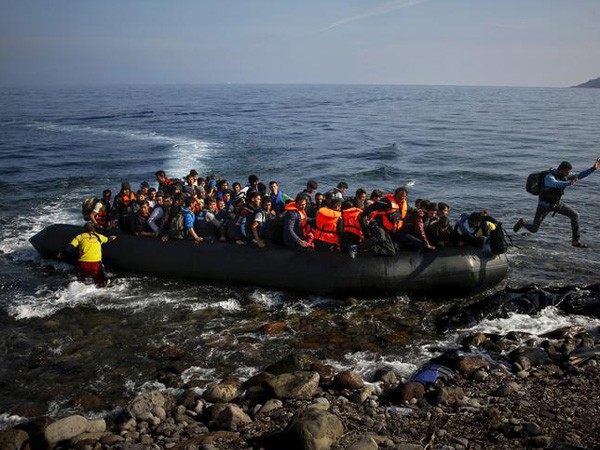Deaths at sea highlight failings in Europe migration policy

- Country:
- United Kingdom
As the waves pounded the gray rubber boat carrying more than 100 Africans hoping to reach Europe from Libya, those aboard dialed the number for migrants in distress frantically. In the series of calls to the Alarm Phone hotline, passengers explained that the dinghy had run out of fuel while trying to cross the Mediterranean Sea and was quickly filling up with water and panic.
On the other end of the line, activists tried to keep the migrants calm as they relayed the boat's GPS coordinates repeatedly to Italian, Maltese and Libyan authorities and later to Frontex, the European Union's border and coast guard agency, hoping authorities would launch a rescue operation as required under international maritime law.
An analysis of logs and emails from Alarm Phone and the NGO SOS Mediterranée as well as reports by the Libyan coast guard show that the national authorities contacted responded slowly, insufficiently or not at all to the pleas for help. In all, approximately 130 people are believed to have died between April 21 and April 22 as they waited in vain for someone to save them, roughly 45 kilometers (30 miles) from the Libyan coast.
It was the deadliest wreck so far this year in the Mediterranean Sea, where more than 20,000 migrants or asylum seekers have perished since 2014, and has renewed accusations that European countries are failing to help migrant boats in trouble.
Instead, human rights groups, the U.N.'s migration and refugee agencies and international law experts say European countries too often ignore their international obligations to rescue migrants at sea and outsource operations to the Libyan coast guard despite its limited capacity, reports of its ties to human traffickers, and the fact that those intercepted, including children, are placed in squalid, overcrowded detention centers where they face abuse, torture, rape and even death.
European nations, of course, routinely rescue migrants in distress. Since the April 21 wreck alone, the Italian coast guard and navy have rescued at least 149 people near its coasts. Spanish authorities, meanwhile, deployed military planes and helicopters as well as rescue ships to airlift three people and recover the bodies of 24 who had died in a wreck April 26 nearly 500 kilometers (310 miles) from the country's Canary Islands.
But no such rescue came on April 21. A day later, merchant vessels sailing in the area and a humanitarian rescue ship, the Ocean Viking, found the boat's remains and reported seeing at least 10 bodies floating on the surface. One of the deceased was hunched over a ring buoy, face in the water.
“I was supposed to be one of the drowned,” 27-year-old Mutawakel Ali said recently from Libya. He and five other Sudanese missed the boat's departure on April 20 from al-Khums by a few minutes because they had stopped on their way to the coast to break their daily Ramadan fast.
But his 23-year-old cousin Mubarak Jaber did not escape. Jaber, the oldest of seven brothers, had quit his economics studies at university and headed for Libya to look for a job a year and a half earlier. He worked in construction, sending money back to his relatives struggling in Sudan's deteriorating economic crisis.
But it still wasn't enough, so he contacted smugglers and boarded the migrant boat.
The rescue and coordination centers of Libya, Italy, Malta were first alerted by Alarm Phone that the boat needed help at 9:52 a.m. Central European Summer Time the next day, according to emails seen by The Associated Press.
Alarm Phone and SOS Mediterranée say they never received any response from Maltese authorities. The Armed Forces of Malta, responsible for maritime search-and-rescue operations, did not respond to several requests for comment from the AP.
It was only at 2:11 p.m., more than four hours later, that Alarm Phone received a response from Italian authorities, asking the activists to inform the “competent authorities'' without specifying who those were.
Alarm Phone was only able to reach a Libyan officer five hours after the first alert, at 2:44 p.m. They were told that the Libyan coast guard was indeed searching for three boats in the area — but with only one vessel, the Ubari.
A day after the wreck, Libyan coast guard spokesperson Masoud Ibrahim Masoud told the AP that his agency had found 106 migrants and two bodies from two other boats. Due to worsening weather and the poor health of those already found, they returned to port before locating the third boat, he said, adding that the support received from the EU was insufficient.
(This story has not been edited by Devdiscourse staff and is auto-generated from a syndicated feed.)
ALSO READ
Under UAE president's directives, Shakhboot bin Nahyan inaugurates integrated field hospital in Chad to support Sudanese refugees
UNESCO needed to work towards protecting Sudanese heritage amid a year of conflict
UN refugee chief says Sudanese refugees may head to Europe if aid not provided
Number of Sudanese forced to flee surpasses 8.5 million after one year of war
BNP Paribas must face lawsuit over Sudanese genocide, US judge rules










